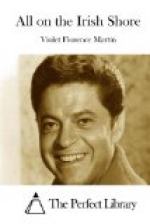Much may be learned at Bandon Fair of how the County Cork hunter is arrived at, of the Lord Hastings colt out of a high-bred Victor mare; of New Laund, of Speculation, of Whalebone, of the ancient and well-nigh mythical Druid, whose name adds a lustre to any pedigree. These things are matters far more real and serious than English history to every man and boy in the fair field, whether he is concerned in practical horse-dealing or not. Even the mere visitor is fired with the acquisition of knowledge, and, in the intervals of saving his life, casts a withering eye on hocks and forelegs, and cultivates the gloomy silence that distinguishes the buyer.
It can hardly fail to attract the attention of the inquirer that, in the highest walks of horsiness, the desire to appear horsey has been left behind. These shining ones have passed beyond symbols of canes, of gaiters, of straws in the mouth; it is as though they craved that incognito which for them is for ever impossible. Bandon Fair was privileged to have drawn two such into its shouting vortex. One wears a simple suit of black serge, with trousers of a godly fulness; in it he might fitly hand round the plate in church. His manner is almost startlingly candid, his speech, what there is of it, is ungarnished with stable slang, his face might belong to an imperfectly shaved archbishop. Yesterday he bought twenty young horses; next week he will buy forty more; next year he will place them in the English shires at prices never heard of in Bandon, and, be it added, they will as a rule be worth the money. Here is another noted judge of horseflesh, in knickerbocker breeches that seem to have been made at home for some one else, in leather gaiters of unostentatious roominess and rusticity. Though the August day is innocent of all suggestion of rain, he carries instead of a riding cane a matronly umbrella. When he rides a horse, and he rides several with a singularly intimate and finished method, he hands the umbrella to a reverential bystander; when the trial is over the umbrella is reassumed. If anything were needed to accent its artless domesticity, it would be the group of boys, horse copers in ambition, possibly in achievement, who sit in a row under a fence, with their teeth grimly clenched upon clay pipes, their eyes screwed up in perpetual and ungenial observation. Their conversation is telegraphic, smileless, esoteric, and punctuated with expectoration. If Phaeton and the horses of the sun were to take a turn round the fair field these critics would find little in them to commend. They are in the primary phase of a life-long art; perhaps with time and exceptional favours of fortune it may be given to them to learn the disarming mildness, the simplicity, that, like a water-lily, is the perfected outcome of the deep.
[Illustration: A HIERARCH OF HORSE-DEALING.]




